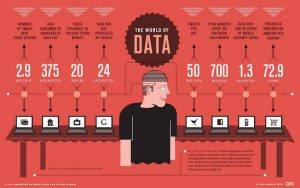Tag: small business
6 Hot Technologies that Handhold Businesses Amid COVID-19 Impact
The COVID-19 pandemic has had wide-ranging ramifications for several businesses. Forrester predicts that the retail sector will endure a 2.1 trillion-dollar loss in 2020 due to COVID-19. It also said that it will take four years for retailers to experience the growth seen before the pandemic. As COVID-19 continues breathing threats down the neck of businessmen, hot technologies are emerging as a relief to counteract them and lead businesses towards their goals. We will discuss a few of these specific technologies such as cloud, eCommerce, eLearning, automation, virtual collaboration, and contactless services that can help you minimize the effects of COVID-19 on your business.
Read More: Fingent’s Response to COVID-19 Business Implications
1. Cloud Adoption During COVID-19
With physical interaction no longer being an acceptable form of communication, organizations and institutions have had to swiftly shift to digital solutions to retain productivity. The domino effect of COVID-19 was seen in various sectors, accelerating the adoption of facilities for seamless remote work. Cloud computing has emerged as an essential technology for critical application and scalability of infrastructure in this regard.
Companies from various sectors are now starting to realize the benefits and value of cloud computing as far-reaching beyond the scenario created by the pandemic. As a result, businesses will have to scale up their digital transformation efforts and invest in cloud resources without delay. If anyone had reservations about investing in cloud computing before this, COVID-19 has proved that its necessity is indisputable.
Read More: 5 Trends That Will Transform Cloud Computing in 2020
2. E-Commerce
CCInsights reported that as of 21 April 2020, US and Canadian e-commerce orders have seen a 129% increase.
With restrictions on the number of people that can be gathered in one place, gone are the glory days of shopping malls and brick and mortar stores. COVID-19 has changed shopping behaviors overnight, necessitating brands to adapt and be flexible to meet changing needs.
For example, the Buy Online Pick up In Store (BOPIS) capability has become vital to maintaining sales volume with the restrictions in mind. A good example of this is the mobile phone industry. When foot traffic is curbed, then Mobile Point of Sale programs can be set up to take orders and payment at the same time for business continuity. Membership or Loyalty cards can be now digitalized through mobile applications.
Read More: How a Smart Product Ordering System Helps Retailers and Wholesalers
3. Virtual Collaboration
Many developed nations are now stipulating that employees of non-essential businesses work remotely for an indefinite time, making video conferencing vital. Schools, colleges, and universities are also leveraging video conferencing platforms through live or recorded lectures.
This has brought many virtual collaboration solutions to the forefront that facilitate video conferencing, instant messaging, task and calendar management, work collaboration, file sharing, attendance tracking, and so on. A few examples include Zoom, DingTalk, WeChat Work, Zoho Remotely, and so on.
At Fingent top software development company, we use InfinCE, a powerful cloud-based enterprise collaboration software that offers support for remote work.
Read Our Case Study: How Fingent enabled a smarter digital workplace solution for Sony Mobile
4. E-Learning
During this time of crisis, the entire education ecosystem is coming together to ensure that students do not suffer. Educational applications, platforms, and resources offer functionalities across multiple categories such as:
- Resources to provide psycho-social support
- Digital learning management systems
- Digital systems designed for use on basic mobile phones
- Massive open online course platforms
- Self-directed learning content
- Mobile reading applications
- Tools for teachers to create digital learning content
Read More: E-Learning Taking A New Front: How Can LMS Technology Help
5. Automation
Automation has been helping businesses mitigate disruption by enabling them to stay connected across teams and systems while maintaining customer support in times of uncertainties such as this pandemic.
Robotic Process Automation improves the efficiency and reliability of work outcomes and automates the time-consuming, repetitive tasks that weigh down intelligent workers. The benefits are:
- Digital workers do not need to have the weekend off. They can work 24 hours a day, 24/7 to respond to spikes in business activity.
- They do not have travel restrictions nor are they at the risk of COVID-19 infection or affected by physical office closure.
During the pandemic, companies that have already invested in automation technologies are doing exponentially better than those who did not. It is obvious, that automation can pave the way for a better future.
Read More: How Automation Ensures Businesses Stay Afloat During COVID-19 Crisis
6. Contactless Services
The coronavirus pandemic has driven a preference for self-service purchasing, boosting contactless services. Consider a few examples available now and upcoming in the future:
- Dining experience: Technology can take care of everything: reserving a table at the restaurant, pre-ordering your food, digital valet services, contactless seating, contactless payment, and online feedback.
- Contactless payment: It lets shoppers integrate their payment information to their loyalty account through an app and then use a QR code for payment through self-checkouts.
- Contactless delivery: This ensures end-to-end hygiene because a customer places an order, makes the payment online, and gets the food delivered without ever coming in contact with the delivery agent.
Read More: Contactless Services: The New Normal in Retail
Grab a Slice of Hot Technology
While the end of the pandemic remains elusive, capturing even a slice of these hot technologies could make a huge difference to businesses. They can even help smaller businesses gain a stronger foothold during this pandemic and into the future. Get in touch with us and help us guide you through this pandemic by implementing the right technology solutions for your business.
Stay up to date on what's new

Featured Blogs
Stay up to date on
what's new



Talk To Our Experts
Ways Small Businesses Can Benefit From Artificially Intelligent Systems
It is quite obvious how Artificial Intelligence has become a part of almost every industry verticals. In addition to enhancing intelligence and productivity to operations, AI is widely used by businesses to predict online customer behavior, manage supply chains, automate various difficult and redundant tasks.
According to a recent survey by Vistage, about three-quarters of businesses will invest in software applications. No wonder the AI revolution is also termed as the fourth revolution!
Starting from voice search mobile app development to self-driving cars being able to prompt the driver with possible destinations, most small businesses are jumping into the AI bandwagon. The early adopters of AI implementation have seen a considerable improvement in business turnover and in achieving an increased ROI.
Businesses have improved their turnover and overall performance by making use of data. Small businesses can make use of the AI Revolution to leverage the available data. This can bring a change in their overall business processes. Below are the major benefits that small businesses can reap out of AI:
Discover How AI Can Benefit Your Business.
1. Leveraging Artificially Intelligent Solutions
The fact that any business process can involve AI implementation proves the importance of large chunks of data being generated. To stay competitive, it is essential for businesses to follow the latest trends in the market. This is made possible by deriving insights from data available to predict business outcomes. The possible benefits of AI enabled systems are as follows:
a. Small businesses can use Artificial Intelligence to understand customer segmentation. AI is used by businesses to gather data and then perform market analytics. They can use AI to advertise as AI helps in providing insights to target the right customer base. This helps in determining market-fit customers rather than having to target clients blindly.
b. Small businesses can also make use of AI strategies. For instance, businesses can use third-party AI tools that involve easy interfaces and machine learning algorithms. This will help businesses to couple the critical data and workflows into business intelligence. This helps businesses to achieve practical insights. It also helps in saving time and costs that arise due to data review.
2. Creating Artificially Intelligent Customer Service Solutions
AI-powered chatbots steal the show when it comes to enabling Digital Customer Services. Estimates show that 67 percent of businesses use chatbots for rendering customer services. This number is forecasted to reach 85 percent by 2020.
Voice-search assistants are no exception to customer service solutions. The number of electronic assistants is expected to reach 7 billion by 2020. Chatbots and voice-search assistants can definitely help small businesses increase their productivity and efficiency.
Related Reading: Check out how capitalizing on chatbots will help in redefining your business.
3. Artificial Intelligence For Building A Positive Workplace Culture
Small businesses often find it difficult to hire talents. Artificial Intelligence has made it simpler for the HR Departments of small businesses to recruit talents by eliminating the need for HR managers to manually set and select through the large pile of candidate profiles. AI helps in building a positive workplace culture in the following ways:
a. Hiring is made easier by Machine learning algorithms. The process of hiring is streamlined by AI. The algorithms do so by the process of learning hiring practices of the past. AI applications help in finding good leads by learning an applicant’s history of work and studies and makes the hiring process easier.
b. Sales can be made simpler for small businesses with the help of AI applications. AI-enabled CRM platforms help businesses to derive insights. CRM systems compile data from different customers via phone, email, etc. This is done for automated lead generation. Sales folks of small businesses can make use of AI enabled CRM systems to adjust their leads by analyzing customer ideas through different channels like recording phone calls, emails, phone messages, online behavior, customer reviews, social media posts, etc. This helps the sales team of businesses to personalize their business, according to customer intentions.
c. Small businesses can use AI applications to manage back-end operations cost-effectively. Financial accounting and scheduling daily tasks to employees can be managed more effectively with the help of AI enabled tools. This helps small businesses save time from performing redundant and manual tasks.
Related Reading: Here’s an ultimate guide for you to enhance your existing business application with AI.
4. AI For Effective Data Collection And Competitive Analysis
Identification of competitors is crucial for any business. AI helps in building a competitive analysis that searches for competitors in particular fields. This helps small businesses to collect critical data regarding different competitor strategies.
Businesses learn about the latest trends from the collected data. This is performed via advanced AI methods such as statistical regression analysis. AI has made it cost-effective for small businesses to use sophisticated AI tools that help them in determining how to keep clients interested in their business.
Machine learning algorithms make use of customer sentiments to capture and track customer preferences. This data collection mechanism is made available affordable by AI for small business.
Competitive Intelligence implies being able to react to market trends rapidly and accurately. It is therefore essential for small businesses to be up-to-date about the current market trends. Tracking competitors, changing business processes to suit customer requirements, analyzing cost changes and business metrics is required for a business to succeed. This is made possible by AI-powered competitive intelligence tools.
Related Reading: Read on to know how artificial intelligence can enhance intelligent app ecosystem.
5. AI Enabled Tools To Enhance Marketing Strategies
Any business requires deep know-how in technology to enhance its marketing functions. Small businesses find it difficult and costly when it comes to hiring top-notch professionals to handle large marketing campaigns.
Small businesses can make use of AI enabled tools to manage marketing activities. AI helps in reaching out to a large audience online by making use of advertising platforms. For instance, Facebook and Google have implemented advertising platforms that are AI implemented. This targets specific customers making it easier to collect and analyze data that is critical for lead generation.
CPC (Cost Per Click) can be considerably reduced by implementing AI tools. In addition to being able to find the best marketing strategies, AI enabled tools also analyze consumer engagement via marketing campaigns.
Artificial Intelligence is an effective budget monitoring source for marketing management activities for a business.
The Artificial Intelligence Revolution can jumpstart your small business to its height. Get in touch with our tech-breathing IT consultants now to learn tips on how to start!
You may also be interested in reading Top AI Technology Trends To Watch Out For In 2019
Stay up to date on what's new

Featured Blogs
Stay up to date on
what's new



Talk To Our Experts
The world of business and technology is ever on the move. Businesses that do not change with the time invariably face obsolescence. Here are the top five developments small businesses can expect to impact their business, in future.
The World Will Increasingly Go Mobile

More are more customers now prefer mobile apps for browsing products conveniently on the move, quick and easy checkout, and other benefits. For the business, mobile apps offer loyalty, as customers who download an app are less likely to go elsewhere. It also allows a convenient way to reach out to customers. About 50% of small businesses will have a mobile app in coming years, and as much as 70% of their online traffic will be through this medium. Through mobile apps, 55% of the small businesses aim to increase sales, 50% of them aim to improve their customer service, and 50% of them aim to become more competitive in their niche. Even sectors where mobile apps have traditionally not found a strong footing, such as restaurants, event organizers, churches and funeral services, and others, is expected to roll out mobile apps in a big way.
E-commerce Will Get More Innovative

Newer, fully integrated and easy-to-use payment options will take center stage. Options such as Google Pay, Apple Pay, Samsung Pay and even PayPal checkout options will become common.
There will be greater integration between online and offline, with customers using apps while shopping in brick and mortar stores to make comparisons, or conversely, online customers picking up orders from physical stores. About 11% of US consumers prefer using their smartphones to make in-store purchases.
With too many e-tailers all vying for the same market, the thrust will be on innovation as the means to stand out and gain competitive advantage.
Big Data will Enter Small Business Space in a Big Way
Hitherto, the costs and efforts associated with big data meant only big businesses could leverage it for their benefit. But the times are changing. The big data will become “democratic” enough, with new solutions enabling even small and medium businesses to embrace the technology in a big way.
Small businesses would increasingly rely on the mountain of customer and historic sales data available at their disposal, before taking marketing and other decisions. 82% of marketers already opine big data as vital to their campaigns. More and more small businesses would leverage big data to personalize product offerings, explore untapped offerings, and engage with customers in a personalized way, and thereby gain competitive advantage.
The big thrust will be on the infrastructure required to collect, analysis, and formulate the required insights.
The Cloud and IoT will Drive Backend Operations

2024 is also the year when the Internet of Things (IoT) will permeate into everyday lives, and change how business is run. Small businesses will be able to leverage IoT to improve connectivity among their workforce. For instance, a smart app that integrates a wearable camera could improve connectivity among geographically dispersed employees, and also improve accountability. Connected devices could report low inventory and reorder automatically, reducing costs. The possibilities are endless.
New Paradigms will replace the Old in Marketing
Digital marketing is going through a churn. Banner ad click-through rates continue to decline, and organic reach for businesses via social media is now almost non-existent. About 49% of consumers now employ some type of ad blocking. In such a scenario, businesses are exploring newer ways to reach out to their target market.
One method likely to go centre stage in future is permissions marketing. Here, consumers give marketer the privilege, rather than the right to offer highly personal and relevant content. Needless to say, only high-quality content and authoritative content will make the cut.
Another method likely to gain big ground is influencer marketing. Word of mouth is already the driving force behind many purchases. Influencer marketing is the next stage. Influencers are persons of authority in their network. Small businesses will look to curate employees as influencers within their circle, or invest in developing external influencers.
What other trends do you foresee for small businesses? Drop in a comment.
Stay up to date on what's new

Featured Blogs
Stay up to date on
what's new



Talk To Our Experts
Up until recent times, small businesses had often struggled to grow and scale their operations. This was mainly because it involved heavy investments in IT, and small businesses couldn’t really afford it.
Large businesses always used IT to their advantage – to run as well as maintain day-to-day business operations.
Hence, there has always been a huge difference in the way IT is used for growth and daily operations by small and large businesses.
Thanks to new innovations in IT, this huge gap is now much smaller. Small businesses now have better opportunities to improve and scale more effectively, without being tied down by the past constraints.
Here are some ways in which IT innovations are changing the game for businesses these days:
- Faster revenue generation – Business enterprises can generate more revenue and grow in a number of ways. They could consider introducing new products and earning new opportunities or they could use their already existing client base to tap new clients. Both of these methods call for an effective and timely socialization or onboarding process for their new clients and partners. Inefficient onboarding processes are often one of the main reasons that keep small businesses from scaling effectively.
With new IT innovations like cloud computing, onboarding processes are no longer the burden of IT. As a matter of fact, an organization’s IT team can enable their business managers to set up their own secure connections easily. Such fast and easy data connections can literally shorten the duration of onboarding processes to a matter of a few days. This in turn, leads to shorter time for conversion of a new client into solid revenue. Thus, it facilitates faster growth of the business as well. - Easier advertising – Traditional ways of advertising often involved the television, newspapers, the radio and even magazines. These demanded pretty large sums of money, not to mention the hours spent in brainstorming ideas as well. All of these had their own limitations in reach too. Now with the latest social media outlets, businesses can get their sales in front of potential customers, in a matter of minutes, that too without burning a hole in their wallets. Social media channels like Facebook, Twitter and Pinterest can really help businesses in establishing their names out there effectively without having to rely on bulky advertisements. Businesses can even have mobile applications to get their products in the hands of their possible customers directly. Put together with interactive promotional offers and contests, they can have their sales shooting up in no time.
- Better business networks – Large businesses used to have their networks built around other large businesses as well as a number of established vendors and suppliers so as to make their products available to a large mass. However, small businesses often had their networks limited to other small businesses alone.
Such limited networks hinder an organization’s ability to scale effectively. Thanks to the latest technology innovations, this is not the case anymore. With the right software solutions, any business entrepreneur can collaborate with any supplier – big or small, and integrate them into the supply chain, even if the suppliers do not have the necessary technology for it. Finding and building connections can be entirely automated these days, making the business networks much wider. - Increased ROI – Growth for small business always meant heavy investments in IT. In order to keep up with their competing big players, they simply had to make IT investment a priority. But they could never afford it.
With cloud-based technologies these days, this problem is solved to a great extent. Small businesses can now have access to advanced IT capabilities without making any huge investments in IT infrastructure or hiring an entire IT department. Scaling with the help of cloud technologies can also eliminate the costs involved in maintenance and hardware, while allowing them to sustain their improvements, without getting broke. This helps them bring up their ROI and grow effectively too.
Growth is no more a pain point for small businesses. IT has literally changed the game for them and has almost leveled their playground with large businesses, equipping them with a number of opportunities and tools to compete and win.
In what other ways do you think IT is changing the game for small businesses? Share with us in the comments below.
Stay up to date on what's new

Featured Blogs
Stay up to date on
what's new
























































